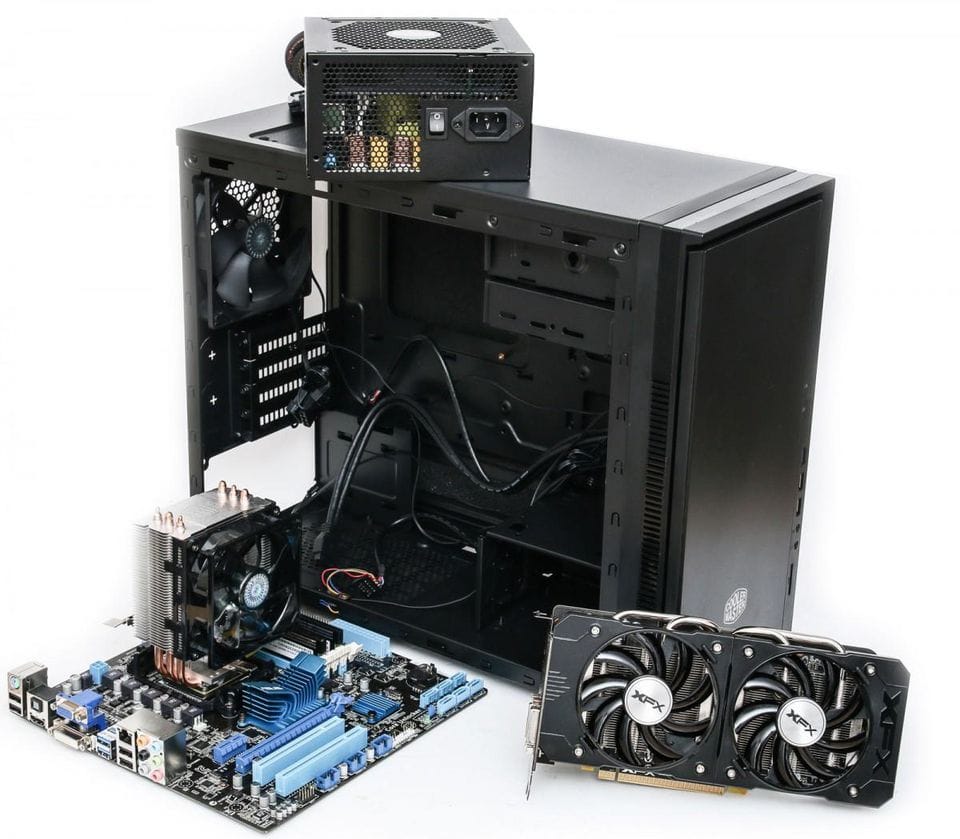In the franticly developing technological landscape which constantly puts out newer and newer demands, building a gaming PC that will go a long way can feel overwhelming, like putting together a jigsaw without a model to follow.
However, the key to assembling a quality, but reasonably priced machine, is getting acquainted with the fundamentals of a gaming PC, the parts that together shape the gaming experience. In that spirit, PC Builder will walk you through the most defining components of a gaming PC under $500 and what to look out for in each of them.
Motherboard
There’s a debate whether you should start with the CPU or the motherboard, however, being the backbone of the entire operation, we put it first.
In fact, the motherboard is actually more reminiscent of a nervous system that transmits signals between the other components and make their functions possible.
Choosing chipsets is one of the major decisions you need to make when picking out a motherboard. Chipsets conduct the data flow between the different components. You can choose between Intel or AMD manufactured, and your choice should be in line with the brand of processors you prefer as the CPU has to be compatible with the chipset, and also with the motherboard’s socket.
Central Processing Unit (CPU)
The CPU is one of the most prominent PC components, and for a reason – it’s the engine.
Compared to other components, CPU is a little more simplistic and its quality is something little more straightforward, mostly determined by its clock rate, or speed in layman’s terms, and just how multi-core it is – dual, triple, or quad.
You don’t necessarily have to go for the most powerful CPU you can find, as it works in close relation with the GPU, so you should strive to create a well-rounded combination.
Random Access Memory (RAM)
RAM is another key element to the gaming experience, with its speed and size being tightly entwined with the frame rates. RAM is also relatively straightforward to measure, as the faster it is and the more of it there is, the better.
Something worth remembering is that a jump in the size of RAM makes a big difference when the size is less altogether, but less and less as the overall size goes up. So, jumping from 4GB RAM to 8GB, you can expect a whole different ballgame, but not as much when going from 16 to 32GB, for example.
Graphics Processing Unit (GPU)
As mentioned above, the GPU works closely with the CPU, as well as the motherboard and RAM, to shape the gaming experience, and it’s in charge of the visual aspect in particular.
Some people fall for the trap of judging a GPU by its most obvious attribute – its VRAM size, the “v” standing for video. However, there’s more to a GPU than that. Clock and memory speed are crucial
elements in the equation, and a GPU that boasts high levels in that regard can outperform another GPU with more VRAM but less speed.
Bus-width is another important factor which determines the amount of information that is processed per cycle. Bus-width can be 64-bit, 128-bit, 256-bit, etc., and even though it isn’t the most game-changing feature, it’s still something to consider, especially if the other parameters of the GPUs between which you’re oscillating are equal.
When speaking about GPUs, it’s important to keep the future in the conversation. Having multiple graphic cards at some point is definitely food for thought, and to that end, you’d need a motherboard and power supply that can accommodate that.
Power Supply Unit (PSU)
The PSU often goes overlooked by unexperienced PC builders, which can be a very costly mistake. In fact, it’s considered a general rule of thumb to never cut expenditures on your custom-made PC from its PSU, as it can end up costing you the entire build.
This is because a low-quality PSU can cause a lot, and perhaps even all of your key PC components to burn in the case of power surges or even just intense gaming.
It’s always wiser to go even a little overboard when choosing a PSU, just to be safe, rather than trying to save a restaurant meal’s-worth of money and risk losing a lot more, not to mention all the time put in assembling.
Hard Disk Drive (HDD)
HDD is the simplest PC component. The more you have, the better, especially as games are becoming increasingly larger.
The good thing is there are more and more ways to expand your PC’s storage, so from all computer parts, the choice of HDD is probably the least stressful one.
These components provide the framework that makes building a gaming PC a much less chaotic and daunting process. You can use this knowledge as a starting point which you can build on with more component-specific reviews and comparisons.
